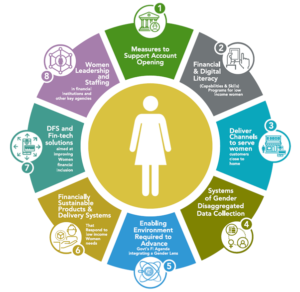Publication Categories
Media Room
EFInA partners with CBN on Framework for advancing Women’s Financial Inclusion in Nigeria
November 4, 2020
The National Financial Inclusion Strategy (NFIS) was launched by the Central Bank of Nigeria (CBN) in 2012 to ensure that a clear agenda is set for increasing both access to and use of financial services in Nigeria by 2020. Access to financial services by individuals and enterprises is however still limited across the country. According to the Enhancing Financial Innovation and Access (EFInA) Access to Financial Services (A2F) in Nigeria 2018 survey, 63.2% of Nigerian adults are financially served while 36.8% are financially excluded.
Women’s access to finance is particularly important in Nigeria as they are considerably more financially excluded than men. The EFInA Access to Financial Services in Nigeria 2018 Survey shows that the national financial inclusion rate for women is 58.9% compared to the inclusion rate of 67.4% for men, giving a gender gap of 8.5%. This gap is particularly acute in rural areas where 24% of women in rural areas report ownership of formal accounts, as opposed to 54% of men. Women have limited access to credit, insurance, savings, and other products, owing to different physical, cultural, religious, and social barriers. Allowing the factors limiting women’s access to financial services to persist would undermine their individual potentials and contribution to economic growth and development.
A mid-term review and refresh of National Financial Inclusion Strategy was carried out in 2018 to provide revised objectives, priorities and principles for driving financial inclusion in Nigeria. This Strategy refresh revealed that the gender gap in terms of access to bank accounts had not narrowed and that over 20.5 million women nationally still did not have access to formal financial services in 2018, thereby making reaching women a primary focus of intervention.
In March 2018, the National Financial Inclusion Special Intervention Working Group (a working group under the National Financial Inclusion Governance structure) constituted a subcommittee to review gender-related financial inclusion issues and propose interventions for addressing the high exclusion rates among women in Nigeria. A key recommendation of the subcommittee was the development of a comprehensive framework that provides a blueprint for enhancing women’s financial inclusion.
The main objective of the Framework is to provide a blueprint for sustainable access to financial services for women in Nigeria. The specific objectives include:
- Setting a target for financial service provision to women in Nigeria
- Providing an implementation plan for the attainment of the target for women’s Financial Inclusion
- Outlining the specific roles and responsibilities of all stakeholders in improving access of women to finance in Nigeria
The analysis in the Framework leverages the Assessment of Women’s Financial Inclusion in Nigeria (conducted by the CBN and EFInA in December 2019)1, which highlighted primary barriers to women’s financial inclusion. Three key barriers identified are a lack of income, a lack of education and low trust in Financial Services Providers. In addition, the Assessment of Women’s Financial Inclusion found that women are less likely than men to use formal (regulated) financial services, even when all other factors are equal, indicating that formal providers are not reaching women effectively.
The Framework was recently completed and launched in September 2020, as an outcome of the joint efforts of the Central Bank of Nigeria (CBN), Enhancing Financial Innovation and Access (EFInA) and the National Financial Inclusion Special Intervention Working Group. The focus on developing a women-specific strategy for financial access stems from the recognition that it is important to treat women as a critically important and distinct customer group, rather than as a subset of a broader group, for example, “vulnerable”.
The Framework further carves out the barriers of particular importance to women, laying out eight strategic imperatives and related recommendations with the greatest potential for addressing these barriers. The formulation of the eight strategic imperatives below takes into consideration the analyses contained in the most recent strategy exercises and background research, as well as stakeholder interviews and webinars specific to this project.

These strategic imperatives and excitement of stakeholders to implement them show a clear case for the major push to reduce the gender gap in women’s financial inclusion in Nigeria. This also shows a compelling value proposition of women’s usage of a broad range of financial products and services, suited to their needs and simply delivered. These fresh ideas lead to an increased focus on closing the financial inclusion gender gap, while further ensuring economic and social empowerment of women.
Framework for Advancing Women’s Financial Inclusion in Nigeria


